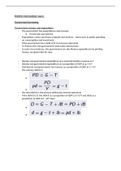Samenvatting
Samenvatting deel Internationaal recht
- Instelling
- Tilburg University (UVT)
- Boek
- International Law
Samenvatting van het deel internationaal van het vak 'introduction to international and european law'. De literatuur, werkcolleges en hoorcolleges zijn hierin verwerkt. Grootste deel van de samenvatting is engels geschreven maar er zit op sommige plaatsen een uitleg of vertaling naar het Nederlands.
[Meer zien]














